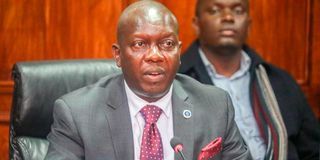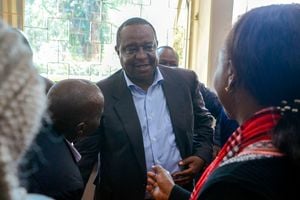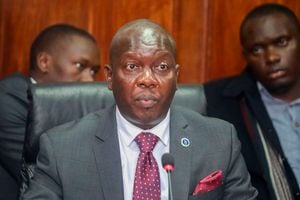
Renson Mulele Ingonga, the Director of Public Prosecutions.
Barely a half year since taking office, Director of Public Prosecutions Renson Ingonga is under the same kind of scrutiny faced by his predecessor, Noordin Haji, over a succession of withdrawn or aborted criminal cases benefiting prominent individuals, some of whom have enjoyed close links with the administration of President William Ruto.
His prosecutors have been subjected to scathing criticism by a magistrate for apparently engineering the collapse of their own cases by failing to produce evidence or call witnesses. Applications to withdraw some cases have also been fiercely resisted in court by the investigating agency, the Kenya Anti-Corruption Authority headed by Twalib Mbarak, bringing into public limelight an open tussle between two of the key justice, governance, law and order institutions in the fight against graft.
Not long after President Ruto assumed office in September 2022, his campaign slogan ‘Freedom is Coming’ rang true for a large number of key political allies, including Deputy President Rigathi Gachagua, who had their trials on corruption and other criminal offenses hastily withdrawn, ostensibly on the Director of Public Prosecutions belatedly discovering there was not enough evidence to file charges in the first place.
Haji left the office in June 2023 when Ruto nominated him to the powerful post of Director-General of the National Intelligence Service, and in September the same year was succeeded as DPP by Ingonga, a career officer in the prosecutions directorate.
A string of acquittals and case withdrawals since last December might indicate that Ingonga has followed in the footsteps of his predecessor in assuring Freedom has Come for prominent personalities who boast close connections in the corridors of power. Among the beneficiaries of cases withdrawn on for lack of evidence or thrown out by judges for apparently wilful prosecution tardiness are former Treasury Cabinet Secretary Henry Rotich and eight co-accused in the Sh63 billion Arror and Kimwarer dams scandal; and former Nairobi Governor Mike Sonko and 16 others in the Sh357 million Nairobi City County theft case. There are also two prominent corruption cases in the past fortnight where attempts by the prosecution to withdraw have been declined by the courts or challenged by the anti-corruption watchdog. One is the Sh30 million corruption case against former Kenya Pipeline Managing Director Charles Kiprotich Tanui, and other company bosses. The other is against the former managing director of the Geothermal Development Corporation, Silas Masinde Simiyu, Company Secretary Praxidis Namoni Saisi and four other members of the tender committee over a Sh42 million tender.
The Weekly Review reached out on phone to the Director of Public Prosecutions for his comments on whether controversies on withdrawal of cases accusations of deliberate sabotage were casting his office in bad light. Ingonga insisted that there was nothing untoward as reasons for any case withdrawals are fully outlined in the applications and available in court documents. He also denied there was any external political pressure, but added that all corruption cases are ‘politically connected’ by virtue of the fact that accused persons routinely claim they are being victimised.
He also pointed out that his office is not the investigating agency, acting on files and recommendations forwarded by the EACC or the Directorate of Criminal Investigations, although he conceded making final decision on how to proceed. On the specific cases listed where presiding magistrates have accused the prosecution of sabotaging its own cases, rejected applications for withdrawal or attracted challenges from the EACC, Ingonga refused to comment further.
Issues of authorities making decisions to prosecute or drop cases on political grounds are nothing new. Ingonga inherited a messy situation where his predecessor, Noordin Haji, left under a cloud over the ‘Freedom has Come’ case withdrawals benefitting Gachagua and other prominent individuals linked to the newly-installed Ruto government.
In the last year of his tenure, Haji had been in open conflict with the then Director of Criminal Investigations George Kinoti over a series of arrests, investigations and recommendations to prosecute a large number of Ruto allies. Kinoti was seen to be targeting allies of the then Deputy President who had fallen out with his boss, then President Uhuru Kenyatta. Haji rejected many of the files forwarded by Kinoti for prosecution, leading to an extraordinary and very public feud where the DCI tried to bypass the DPP and charge suspects directly.
But there were also cases where Haji did proceed with prosecution, only to turn around after change of regime and drop a string of cases on grounds of insufficient evidence. Beneficiaries were all Ruto allies, which raised eyebrows and even prompted some human rights lobbies to oppose his nomination to head the National Intelligence Service on grounds that he was politically compromised. Ingonga’s elevation to the job was a shift from established precedence over the last few terms where the prosecution boss was recruited from outside the service.
He was a low-key system insider who assumed office without any fanfare and preferred to keep a low profile. But he did not help but attract massive attention with the decision on the Rotich case. When freeing the former Treasury CS last December for lack of evidence, trial Magistrate Eunice Nyutu delivered a scathing indictment of the ODPP.
“This would appear to be a prosecution led acquittal,” she remarked, “All the accused persons in this case are hereby acquitted under section 201 due to lack of evidence as a result of the reckless dereliction of duty by the prosecution.” She noted that the prosecution had affectively abandoned its own case after calling only eight of its 49 listed witnesses and then employing delaying tactics to avoid putting the others on the stand. Other beneficiaries of the acquittal were David Kipchumba Kimosop, William Kipkemboi Maina, Paul Kipkoech Serem, Francis Chepkonga Kipkech, Titus Murithi, Geoffrey Mwangi Wahungu, Kennedy Nyakudi and Jackson Kinyanjui. The magistrate concluded that there is a need to check the conduct and behaviour of the ODPP when it comes to commencing cases which they have no intention of pursuing to conclusion. Four lobby groups have since gone to court seeking to have the prosecutors held liable for allegedly bungling the case.
The Kenya Human Rights, Transparently International, Katiba Institute and Africa Centre for Open Governance accuse Ingonga and prosecutors Geoffrey Obiri and Oliver Mureithi of reckless dereliction of duty, abuse of office and taking direction from external forces.
Another case that caught attention was the acquittal of Sonko. Early in February, Nyutu acquitted the controversial former Nairobi governor, again delivering a scathing indictment of prosecution misdeeds. She noted that the prosecution bungled the case by failing to table evidence and calling only six witnesses of 38 witnesses lined up. “It’s tragic that a prosecution can lose sight of a case. The conduct by prosecution in this case reeks of neglect of duty,” she said, taking issue with the prosecution for failing to conduct the case in a manner that promotes public interest and public good.
Sonko and 16 others had been charged with a total of 19 graft charges. They were accused of conspiring to corruptly embezzle public funds to a tune of Sh357,390,299.95 from Nairobi County government. They also faced money laundering charges and the acquisition of proceeds of crime. And twice in the past 10 days, prosecutors from Ingonga’s office and investigators from Twalib’s unit have clashed in court over decisions to withdraw high-profile criminal cases.
On February 22, the Ethics and Anti-Corruption Commission opposed an application by the Director of Public Prosecutions seeking the withdrawal of corruption cases against former officials of Geothermal Development Company. The officials were charged in 2015 alongside former managing director Silas Masinde Simiyu, GDC company secretary Praxidis Namoni Saisi and four other members of the company’s tender committee.
The GDC officials had challenged their prosecution all the way to the Supreme Court, which ruled that the case proceed to finality. The EACC told trial magistrate Thomas Nzuki that the intention to withdraw criminal charges against Mr Nicholas Karuma, Mr Peter Ayodo Omenda and Mr Caleb Indiatsi was not made in the public interest.
On Friday the previous week, the EACC similarly opposed plans to drop abuse of office charges against former Kenya Pipeline Company managing director Charles Tanui, former chief engineer Josephat Kipkoech Sirma and chief technical manager Elias Maina Karumi.
The Milimani High Court sided with the EACC and declined to have the case withdrawn. The prosecution had presented 25 witnesses before changing tune and declining to call the last witness, an EACC Investigating Officer, to the stand.







